Fat has been vilified in diet culture for decades, but recent research challenges this notion. Many people still believe that cutting fat is the key to losing weight. The truth is more complex.

Eating healthy fats can actually help with weight management when part of a balanced diet. Fats are essential for many bodily functions and can help you feel full longer. Not all fats are created equal, though. Some fats are better for health than others.
The idea that “all calories are equal” when it comes to weight loss is a common myth. The type and quality of calories matter. Fats, proteins, and carbs affect the body differently. Understanding these differences can lead to more effective weight management strategies.
Key Takeaways
- Fat is not inherently bad for weight management and can be beneficial when consumed in moderation
- Different types of fats have varying effects on health and weight
- A balanced approach to diet and exercise is more effective than simply cutting out fat
Understanding Body Fat

Body fat plays vital roles in our health and well-being. It’s not just about weight, but also about how fats function in our bodies and affect our hormones.
The Role of Fats in the Body
Fats are essential for survival. They provide energy, protect organs, and help absorb vitamins. Body fat is crucial for regulating hormones like insulin and leptin. These hormones control hunger and metabolism.
Fat also insulates the body and maintains body temperature. It’s a key part of cell membranes, helping cells function properly.
The body needs some fat to stay healthy. Men need about 3% body fat, while women need about 12% for basic functions.
Different Types of Dietary Fats
Not all fats are the same. There are several types:
- Saturated fats: Found in animal products and some tropical oils
- Trans fats: Mostly in processed foods, these are unhealthy
- Monounsaturated fats: In olive oil and avocados, these are heart-healthy
- Polyunsaturated fats: Include omega-3 and omega-6 fatty acids
Eating the right fats can help with weight management. Healthy fats make food taste good and help people feel full longer.
The Function of Fats in Hormones and Body Weight
Fats are key in making hormones that control weight. These hormones affect hunger, metabolism, and fat storage.
For example, fat cells produce leptin. Leptin tells the brain when the body has enough energy stored. This helps control appetite and metabolism.
Fats also help make sex hormones like estrogen and testosterone. These hormones influence where the body stores fat.
Eating a balanced diet with healthy fats can support hormone function. This can help maintain a healthy body weight.
Nutritional Science and Fat Consumption
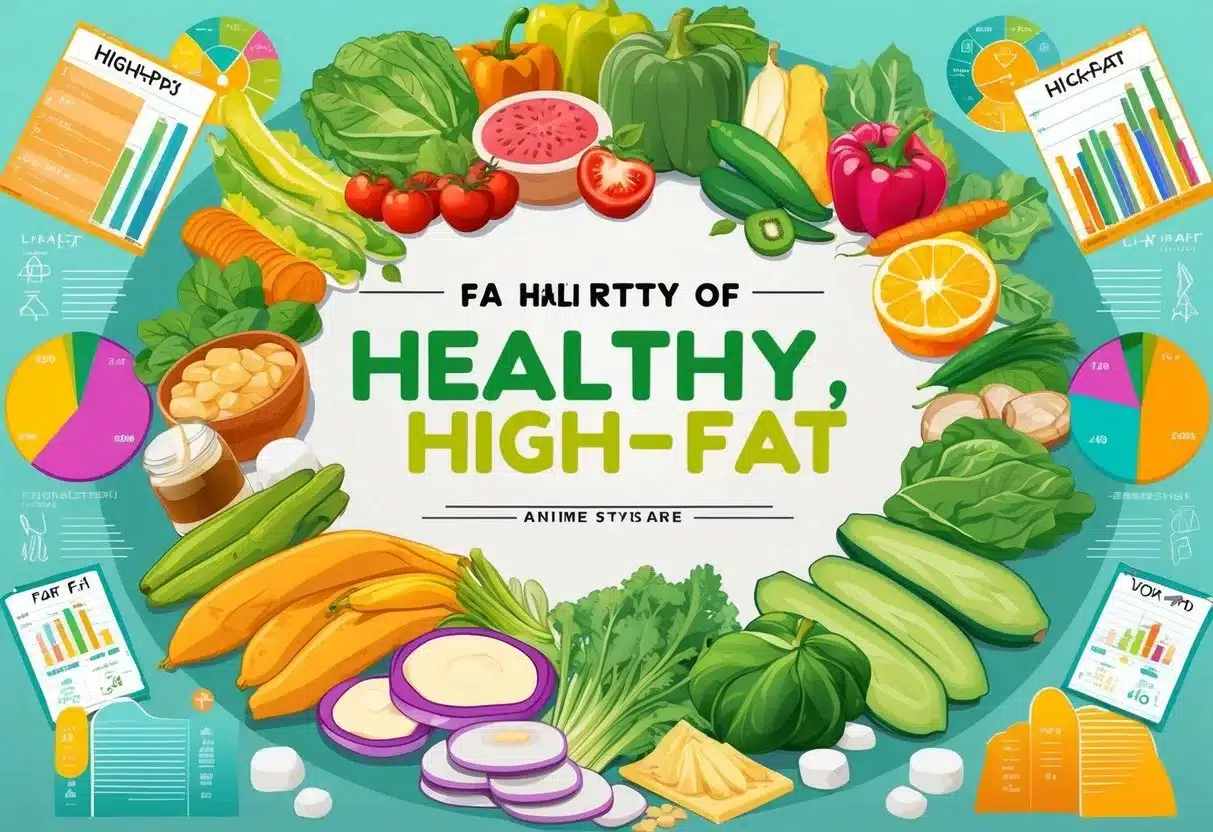
Fat plays a complex role in our diets and health. Research has shifted views on dietary fats over time. Let’s look at how fats relate to heart disease, obesity, and current guidelines.
Dietary Fats and Heart Disease
Saturated fat intake has long been linked to heart disease risk. Many health groups suggest limiting saturated fat to under 10% of daily calories. But this view is changing.
New studies show the link may not be as strong as once thought. The type of fat matters more than total amount. Replacing saturated fats with unsaturated fats seems to lower heart disease risk.
Trans fats are still seen as harmful. Most experts agree on avoiding artificial trans fats. Natural trans fats in dairy and meat may be less risky.
Fat Intake and Obesity
Fat has 9 calories per gram, more than carbs or protein. This led to the idea that eating fat causes weight gain. But research doesn’t fully support this.
Low-fat diets don’t always lead to weight loss. Some high-fat diets, like the Mediterranean diet, are linked to good health. The key is the type of fat and overall diet quality.
Eating too many calories from any source can lead to weight gain. Fat can be part of a healthy diet when consumed in moderation.
Dietary Guidelines on Fat
Current dietary guidelines focus on fat quality rather than just quantity. They suggest:
- Limiting saturated fat to 10% or less of daily calories
- Avoiding trans fats
- Choosing unsaturated fats from plants and fish
The guidelines no longer set a strict limit on total fat intake. Instead, they promote balance and emphasize whole foods over processed ones.
Experts now recognize that low-fat diets aren’t always best for health or weight control. A mix of healthy fats can be part of a nutritious eating plan.
The Myth of Low-Fat Diets
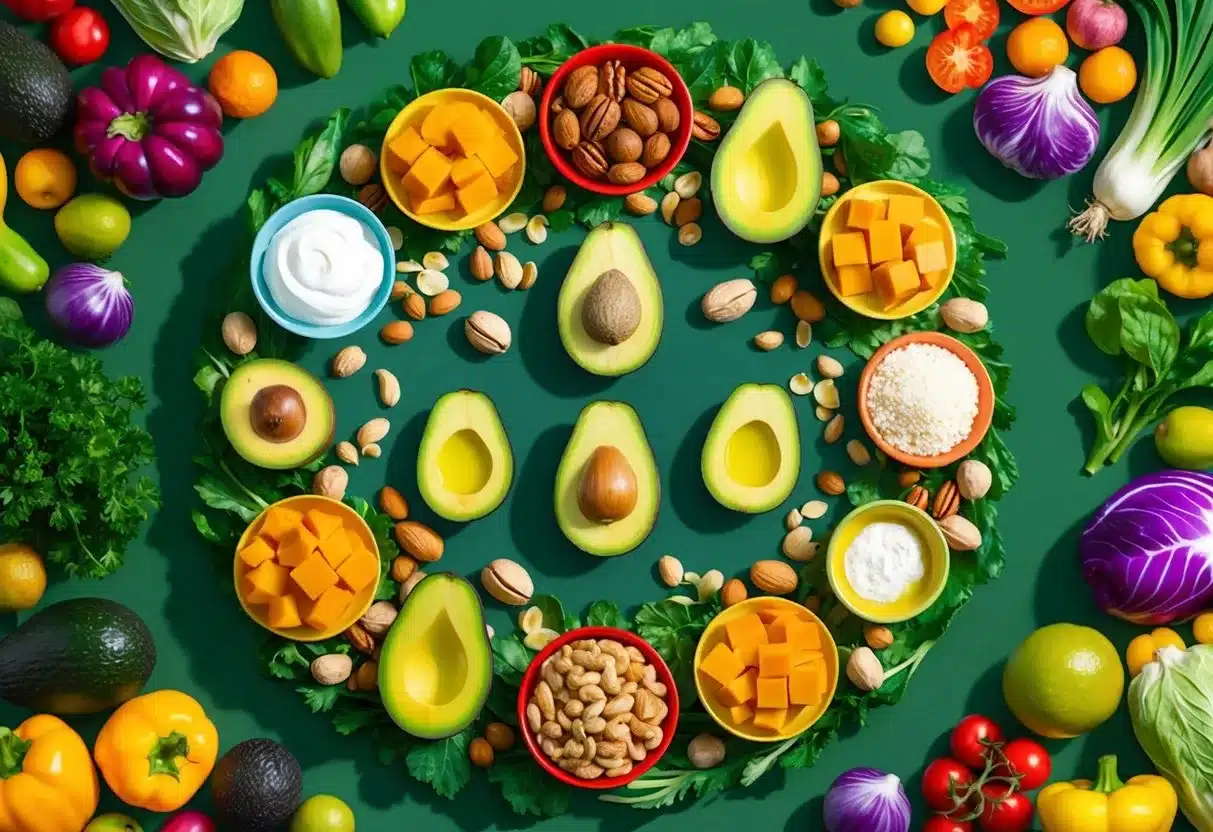
Low-fat diets became popular as a way to lose weight. But research shows they often don’t work as expected. These diets can have hidden downsides that impact health and weight loss goals.
Risks Associated with High Sugar Intake
Many low-fat foods add sugar to improve taste. This extra sugar can lead to weight gain and health issues. Studies found that low-fat products often contain more sugar than regular versions.
High sugar intake is linked to:
• Increased calorie consumption
• Blood sugar spikes
• Higher risk of diabetes
• Tooth decay
People may eat more of these foods thinking they’re healthier. But the added sugar can undo any benefits from reducing fat.
False Promises of Low-Fat Options
Low-fat foods don’t always help with weight loss. Many people believe eating fat makes you fat. This isn’t true. The body needs some fat for energy and cell growth.
Fat helps you feel full. Low-fat diets can leave people hungry and unsatisfied. This may lead to overeating or snacking on unhealthy foods.
Some fats are good for health. Cutting out all fats means missing out on:
• Omega-3 fatty acids
• Fat-soluble vitamins
• Heart-healthy monounsaturated fats
The Impact on Metabolic Rate
Low-fat diets can slow down metabolism. The body needs fat to function properly. Without enough fat, metabolic rate may decrease.
A slower metabolism makes it harder to lose weight. It can also lead to:
• Fatigue
• Difficulty concentrating
• Hormone imbalances
Experts now say that not all fats are bad. Some fats are important for a balanced diet. Including healthy fats can actually boost metabolism and aid weight loss.
Eating a mix of nutrients is key. This helps keep metabolism running smoothly. It also supports overall health and sustainable weight management.
Healthy Fats for Weight Management
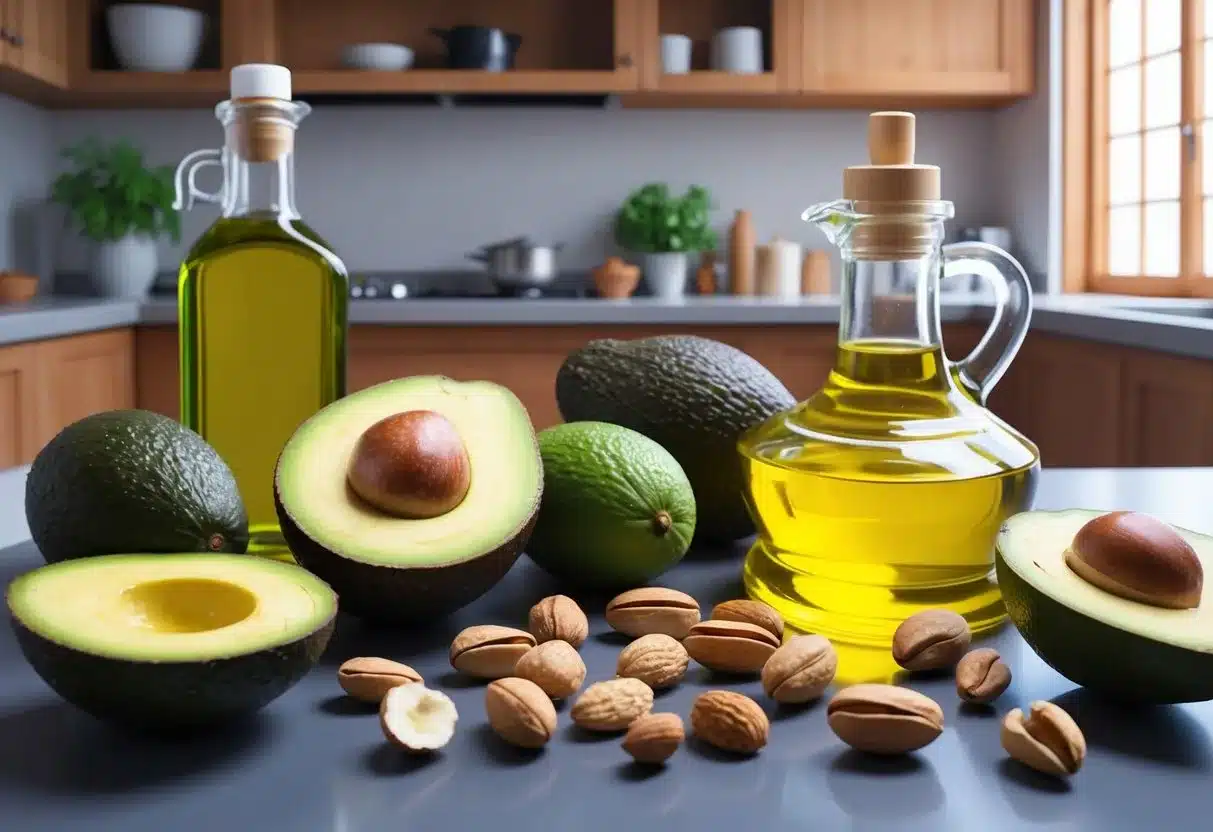
Healthy fats play a key role in weight management. They keep you full, help absorb nutrients, and support your body’s functions. Let’s explore how to use these fats for better health and weight control.
Integrating Healthy Fats into the Diet
Adding healthy fats to meals can boost satiety and nutrition. Avocados, nuts, and seeds are great sources. Try adding sliced avocado to salads or sandwiches. Sprinkle nuts on oatmeal or yogurt. Use olive oil for cooking and dressings.
Aim for balance. Too much fat, even healthy kinds, can lead to weight gain. A good rule is to include a small amount of healthy fat at each meal. This could be a tablespoon of nuts or seeds, a quarter of an avocado, or a teaspoon of olive oil.
Choose whole food sources when possible. These offer more nutrients than processed oils alone.
Role of Healthy Fats in Weight Loss
Healthy fats can aid weight loss in several ways. They slow digestion, which helps control hunger. This can lead to eating less overall. Fats also help the body absorb vitamins A, D, E, and K.
Some fats, like those in fish, may boost metabolism. Others, like those in nuts, might help the body burn more calories. Eating fat doesn’t make you fat. It’s about the total calories you eat.
Replacing unhealthy fats with healthy ones can improve heart health. This is key for safe, long-term weight management.
Spotlight on Nuts, Seeds, and Oils
Nuts and seeds pack a lot of nutrition in a small package. They’re rich in protein, fiber, and healthy fats. Walnuts are high in omega-3 fats. Almonds offer vitamin E. Chia seeds provide fiber and omega-3s.
Olive oil is a staple of the heart-healthy Mediterranean diet. It’s rich in monounsaturated fats. Use it for cooking or as a salad dressing.
Other healthy oils include avocado and flaxseed oil. These can be used in cooking or added to smoothies for a nutrition boost.
Remember to watch portion sizes. A serving of nuts is about a small handful. For oils, stick to 1-2 tablespoons per day.
The Role of Exercise in Fat Management

Exercise plays a key part in managing body fat. It boosts metabolism and helps maintain a healthy weight. Physical activity also improves overall health and well-being.
Physical Activity and Fat Metabolism
Regular exercise increases the body’s metabolic rate. This means the body burns more calories, even when resting. Lean muscle mass burns more calories than fat tissue.
Aerobic activities like running or swimming use fat as fuel. These exercises can help reduce body fat over time. Strength training also helps build muscle, which increases resting metabolic rate.
The body doesn’t just burn fat in the areas being exercised. Instead, fat loss occurs throughout the body during physical activity.
Creating an Exercise Plan
A good exercise plan includes both cardio and strength training. The U.S. Department of Health and Human Services suggests at least 150 minutes of moderate-intensity aerobic activity per week for adults.
Strength training should be done 2-3 times per week. This helps build and maintain muscle mass.
It’s important to start slowly and gradually increase intensity. This helps prevent injury and builds fitness over time.
Supervised exercise programs can lead to significant weight loss. In one study, participants lost 3.9 to 5.2 kg over 10 months with supervised exercise.
Consistency is key. Regular physical activity is more effective for long-term fat management than sporadic intense workouts.
Fats, Chronic Conditions, and Overall Health
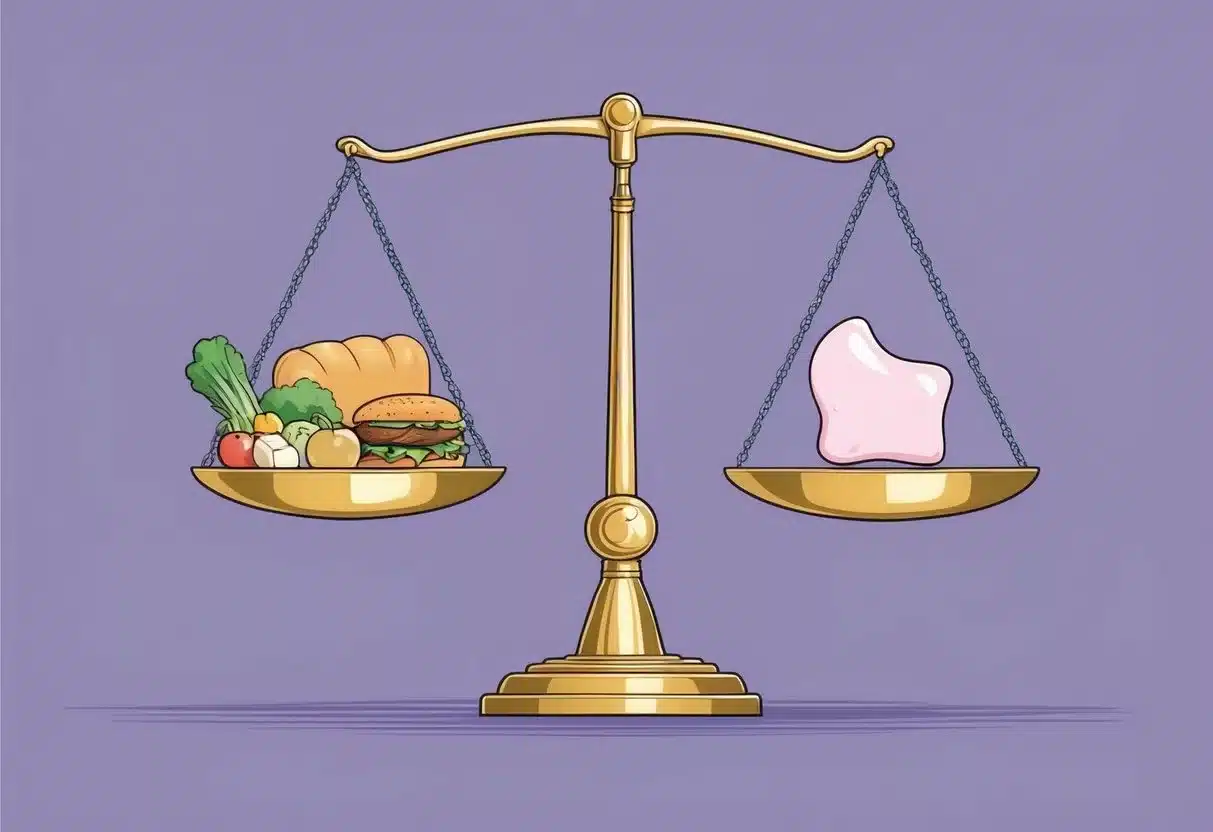
Dietary fats play a complex role in health. They impact several chronic conditions in different ways. Let’s explore how fats relate to diabetes, inflammation, and cancer risk.
Fat Consumption and Diabetes
Fat intake affects blood sugar control and insulin function. High-fat diets may increase insulin resistance, a key factor in type 2 diabetes. But not all fats are equal.
Saturated fats can worsen insulin sensitivity. In contrast, unsaturated fats may help. Omega-3 fatty acids, found in fish and nuts, can improve insulin function.
The quality of fat matters more than the amount. Replacing saturated fats with unsaturated ones can lower diabetes risk. This switch may also help manage blood sugar in those who already have diabetes.
Inflammation and Fatty Acids
Different fats can either increase or decrease inflammation in the body. Chronic inflammation is linked to many health issues.
Omega-6 fatty acids, common in vegetable oils, can promote inflammation when consumed in excess. On the other hand, omega-3 fatty acids have anti-inflammatory effects.
A balanced intake of omega-6 and omega-3 fats is key. This balance can help reduce inflammation and lower the risk of related conditions like heart disease.
Monounsaturated fats, found in olive oil and avocados, also have anti-inflammatory properties. Including these in the diet may help combat chronic inflammation.
Dietary Fats and Cancer Risk
The link between dietary fats and cancer is complex. Some studies suggest a connection, while others find no clear link.
High intake of saturated and trans fats may increase cancer risk. These fats are often found in processed foods and red meat. Limiting these fats could potentially lower cancer risk.
On the flip side, some fats might be protective. Omega-3 fatty acids may help reduce the risk of certain cancers. Fish, walnuts, and flaxseeds are good sources of omega-3s.
The way fats are cooked also matters. Frying at high temperatures can create harmful compounds. These compounds may increase cancer risk. Choosing healthier cooking methods like baking or steaming can be a safer option.
Practical Tips for Managing Dietary Fats

Dietary fats play a key role in a balanced diet. Learning to manage them well can improve health and support weight goals. Here are some useful tips for handling fats in your meals.
How to Read Nutrition Labels
Reading nutrition labels helps you make smart choices about dietary fats. Look for the “Total Fat” line on food packages. This shows how much fat is in one serving.
Pay attention to the types of fats listed. Saturated and trans fats should be limited. Monounsaturated and polyunsaturated fats are better choices.
Check the serving size too. Many packages contain multiple servings. You may eat more fat than you think if you consume the whole package.
Some foods high in healthy fats don’t have labels. These include:
- Avocados
- Nuts
- Seeds
- Fatty fish like salmon
Portion Control and Fat Intake
Controlling portions helps manage fat and calorie intake. Use these tips:
- Use smaller plates to make portions look bigger.
- Measure oils when cooking. One tablespoon is often enough.
- Eat nuts in small handfuls, not from the whole bag.
- Use your palm to estimate a serving of meat or fish.
Remember that fats have more calories per gram than carbs or protein. A little goes a long way. Include some fat with each meal for better vitamin absorption and feeling full.
Protein-rich foods can also help control portions. They make you feel full longer.
Choosing the Right Fats for Cooking
Pick the right fats for cooking to boost nutrition and flavor. Some oils are better for high heat, while others are best used cold.
For high-heat cooking:
- Avocado oil
- Coconut oil
- Ghee
For medium-heat cooking:
- Olive oil
- Peanut oil
For low-heat or no-heat uses:
- Flaxseed oil
- Walnut oil
Nonfat or low-fat dairy can replace full-fat versions in many recipes. This cuts calories while keeping protein.
Try using mashed avocado or nut butter instead of butter on toast. These provide healthy fats and nutrients.
Popular Fat-Related Diets Examined
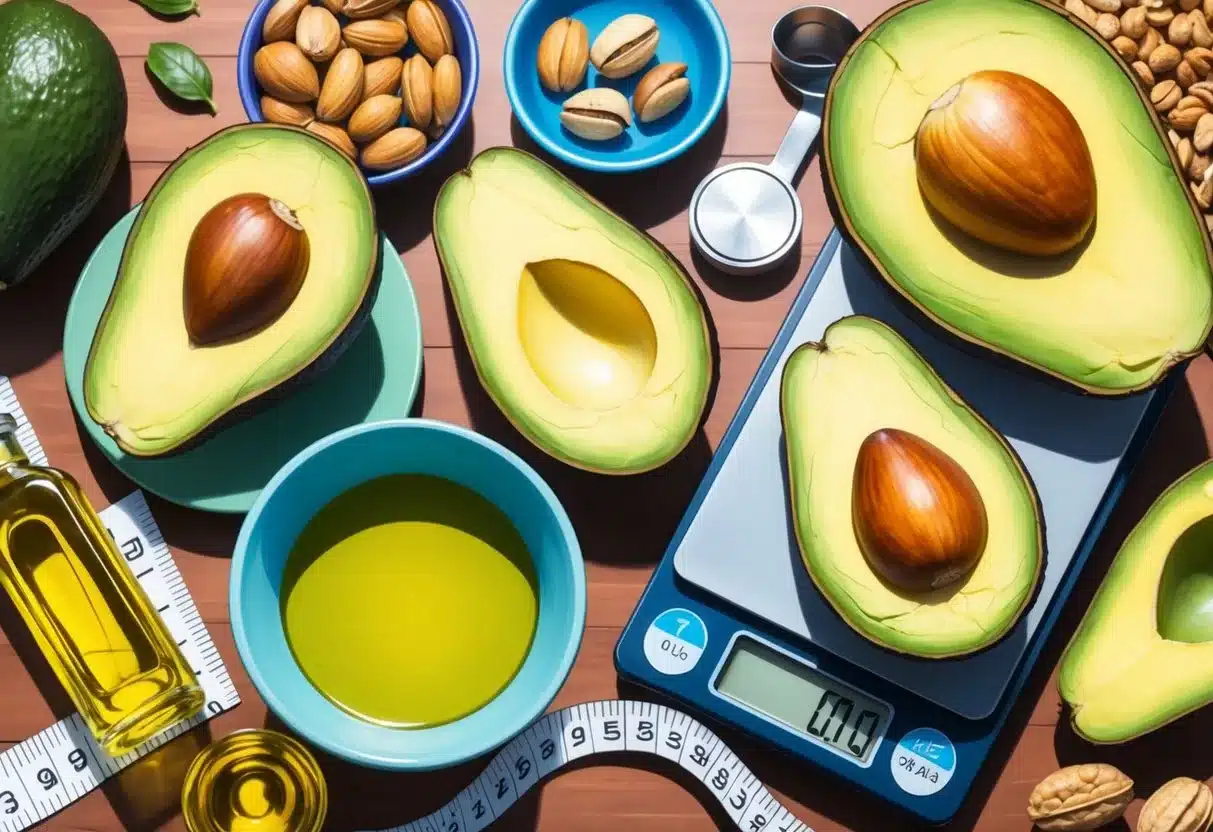
Different diets approach fats in unique ways. Some diets focus on specific types of fats, while others adjust overall fat intake. Let’s look at three popular diets and how they handle fats.
Mediterranean Diet and Fats
The Mediterranean diet puts healthy fats front and center. It favors olive oil, nuts, and fatty fish. These foods provide heart-healthy omega-3 fatty acids and monounsaturated fats.
Studies show this diet can help with weight management. It may also lower the risk of heart disease and diabetes. The diet is not low-fat, but it focuses on good fats.
People who follow this diet often eat:
- Olive oil as the main cooking fat
- Fish at least twice a week
- Nuts and seeds daily
- Avocados regularly
Ketogenic Diet and its Approach to Fats
The ketogenic diet is high in fat and very low in carbs. It aims to put the body in a state called ketosis. In this state, the body burns fat for fuel instead of carbs.
On a keto diet, 70-80% of calories come from fat. This is much higher than most other diets. The diet includes foods like:
- Butter and cream
- Fatty meats
- Eggs
- Cheese
- Nuts and seeds
Some studies suggest keto diets can lead to more weight loss in the short term compared to low-fat diets. But long-term effects and safety are still being studied.
Assessing Plant-Based Diets
Plant-based diets can vary in their fat content. Some are low in fat, while others include plenty of healthy plant fats. These diets focus on foods from plants and limit or avoid animal products.
Plant-based diets often include fats from:
- Nuts and seeds
- Avocados
- Olive oil
- Coconut
These diets can be good for weight management. They often lead to lower calorie intake due to high fiber content. Plant-based diets may also help lower the risk of heart disease and diabetes.
The key is choosing whole plant foods rather than processed vegan products. This helps ensure a good balance of nutrients, including healthy fats.
Societal and Psychological Perspectives

Our views on fats are shaped by culture, psychology, and media. These factors influence how we think about and consume fats in relation to weight and health.
Cultural Attitudes towards Fats
Different cultures have varying views on fat consumption. Some see fats as essential for health, while others view them negatively.
In the American diet, fats were often seen as harmful. This led many to avoid them for weight management. But this view is changing.
Some cultures prize fatty foods as signs of wealth and good health. Others link a fuller figure to beauty and prosperity.
These cultural beliefs impact how people approach fats in their diets. They also affect views on body size and what’s seen as a healthy body.
Psychology of Eating Fats
The way we think about fats affects our eating habits. Many people feel guilty when eating fatty foods. This can lead to unhealthy relationships with food.
Weight stigma can cause stress and harm health. It may lead to avoiding healthcare and increased weight gain.
Fear of fats can result in restrictive diets. These often fail long-term and may cause weight cycling. This can be harmful to physical and mental health.
Balanced views on fats can support healthier eating patterns. This may help in managing weight without extreme measures.
Marketing and Misinformation
Food marketing has a big impact on how we view fats. Many products are labeled as “low-fat” or “fat-free” to appeal to health-conscious buyers.
This marketing can be misleading. It often ignores the role of healthy fats in a balanced diet. It may also hide high sugar content in low-fat foods.
Media reports on fats can be confusing. They sometimes contradict each other or oversimplify complex nutritional science.
Clear, accurate information is key for making informed choices about fats. This can help people maintain a healthy weight without fearing all fats.
Frequently Asked Questions

Fats play a complex role in nutrition and health. Different types of fats have varying effects on the body, cholesterol levels, and weight management.
What is the difference between saturated and unsaturated fats?
Saturated fats are solid at room temperature and come mainly from animal sources. Unsaturated fats are liquid at room temperature and come mostly from plant sources.
Saturated fats can raise bad cholesterol levels, while unsaturated fats can help lower them.
How do different fats impact cholesterol levels?
Saturated fats tend to raise LDL (bad) cholesterol. Unsaturated fats, especially polyunsaturated fats, can help lower LDL cholesterol.
Trans fats are particularly harmful, as they raise LDL cholesterol and lower HDL (good) cholesterol.
Can you provide examples of unhealthy fats?
Trans fats are the most unhealthy type of fat. They are found in some processed foods and fried fast foods.
Some examples include partially hydrogenated oils, fried foods, and certain baked goods.
Are monounsaturated fats beneficial for health?
Yes, monounsaturated fats are considered healthy fats. They can help lower bad cholesterol levels and reduce heart disease risk.
Good sources include olive oil, avocados, and nuts like almonds and peanuts.
How do polyunsaturated fats fit into a healthy diet?
Polyunsaturated fats are essential fats that the body needs but can’t produce. They include omega-3 and omega-6 fatty acids.
These fats can help lower cholesterol and reduce heart disease risk. Sources include fatty fish, walnuts, and flaxseeds.
Which fats are considered beneficial for weight management?
Healthy fats like monounsaturated and polyunsaturated fats can be part of a balanced diet for weight management.
These fats help you feel full and satisfied, which can prevent overeating. They also support nutrient absorption and hormone production.